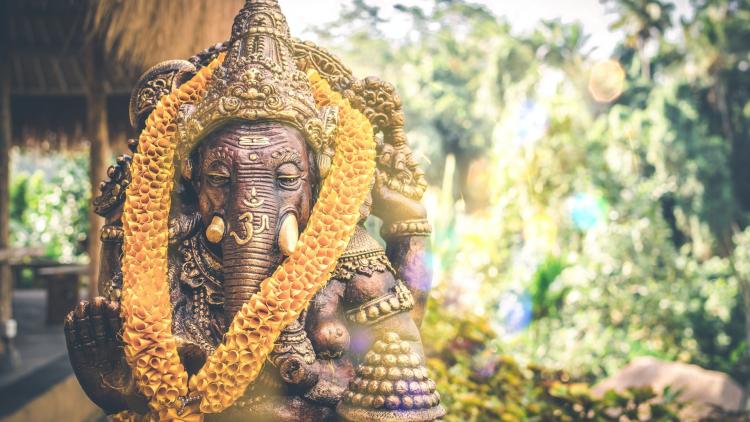Ancient and Medieval Indian Philosophy

Key information
- Start date
- End date
- Year of study
- Year 2, Year 3 or Year 4
- Duration
- Term 1
- Module code
- 158000098
- FHEQ Level
- 5
- Credits
- 15
- Department
- Department of Religions and Philosophies
Module overview
The aim of this course is to provide students with an overview of the principal philosophical questions and perspectives that emerged in ancient India and shaped philosophical and religious debates throughout Indian history, such as origin and building blocks of the universe, ways of knowing, the nature of existence, self and god, causality, action and its consequences, limits of morality, paths of salvation. The course focuses on early Vedic texts such as the ṚgVeda and the Upaniṣads and on the literature of later Brahmanical schools of Sāṃkhya, Yoga, Nyāya, Vaiśeṣika and Vedānta, and the schools of the Lokāyatas, Jainas and Ājīvikas, which, like those of the Buddhists, present themselves as non-Vedic. The course culminates in a comparison of competing doxographic approaches, philosophies of philosophy, and the Jaina philosophy of non-one-sidedness, and concludes with a comparison of the teachings of three key individual thinkers of classical Indian philosophy, Nāgārjuna, Kundakunda and Śaṅkara. The course challenges narrow western representations of Indian philosophy as per se spiritualistic and focuses on the competition and consequences of key ideas, individual philosophers and schools of thought in historical context.
Objectives and learning outcomes of the module
On successful completion of this module a student will be able to:
- Demonstrate a critical understanding of the principal trends of speculative thought reflected in the ancient and medieval philosophical schools directly related to the main Vedic and non-Vedic textual traditions.
- Identify the connections between ontology, soteriology, ethics, epistemology and theory of language as they relate to the schools of thought examined in the course.
- Critically evaluate the arguments presented in the secondary literature regarding the historical development and philosophical and social significance of the schools and authors discussed.
- Critically assess the arguments presented in the primary sources (in translation) regarding the key areas discussed in the course.
- Appreciate the contributions made by Indian philosophers in the arenas of ontology, ethics, epistemology and theory of language.
- Describe and critique the various ways in which the Vedic texts have inspired a variety of philosophical approaches.
Workload
- A total of 10 weeks teaching with a 2 hour lecture per week.
Scope and syllabus
- Introduction to Indian Philosophy
- Origins of Indian Philosophy in the ṚgVeda
- Self and the Absolute in the Upaniṣads
- Indian Materialism: Cārvāka/Lokāyata Philosophy
- Karma and Salvation in Early Jaina, Ājīvika and Buddhist Philosophy
- The Bhagadadgītā in the Mahābhārata
- Sāṃkhya-Yoga: Dualism and Spiritual Atomism
- Nyāya-Vaiśeṣika: Logic and Philosophy of Nature
- Doxography and the Jaina Philosophy of Non-One-Sidedness
- Kundakunda, Nāgārjuna, Śaṅkara: Supreme Self, Emptiness, Oneness
Method of assessment
- One Reaction Paper, 500 words (20%)
- One Essay, 2,500 words (80%)
Suggested reading
- Adamson, P. & J. Ganeri. Classical Indian Philosophy. Oxford: Oxford University Press, 2020.
- Bartley, C. An Introduction to Indian Philosophy. New York: Continuum, 2011.
- Dasgupta, S. A History of Indian Philosophy. Vol. 1-5. Delhi: Motilal Banarsidass, (1922) 1988- 1991. [& further links]
- Halbfass, W. India and Europe: An Essay in Philosophical Understanding. Albany: SUNY, (1981) 1988.
- Hamilton, S. Indian Philosophy: A Very Short Introduction. Oxford: OUP, 2001.
- Hiriyanna, M. Outlines of Indian Philosophy. London: Allen & Unwin, 1932.
- King, R. Indian Philosophy: An Introduction to Hindu and Buddhist Thought. Edinburgh: Edinburgh University Press, 1999.
- Mohanty, J.N. Classical Indian Philosophy. Lanham: Rowman & Littlefield, 2000.
- Perrett, R.W. An Introduction to Indian Philosophy. Cambridge: CUP, 2016.
- Radhakrishnan, S. Indian Philosophy. Vol. I-II. London: Allen & Unwin, (1923, 1927) 1929.
- Smart, S. Doctrine and Argument in Indian Philosophy. London: Allen & Unwin, 1964.
Convenor
Disclaimer
Important notice regarding changes to programmes and modules


